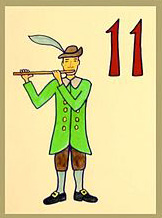Le onzième jour de Noël, mon amour m’a donné : onze joueurs de flûte…
(On the eleventh day of Christmas, my true love gave to me: eleven pipers piping…)
Just the neighbours calling to ask me to be quiet. Rude!
Notice again it’s not “L’onzième” because as we aready learned in line eight, we don’t use elision in front of numerals.
The last two lines suffer the same horrible translation problems. I make no claims these are great translations because they’re not, they’re just a bit less terrible than others I’ve seen around. The problem is, English has verbs for everything (you can verbify nouns, just like I’ve done with “verb” there, which is how we end up with new verbs like “friending”).
French doesn’t work this way, so pipers don’t “pipe”, they “play the pipe”. Drummers don’t “drum”, they “play the drum”. On top of this, one needs to be ve-e-ery careful with expressions involving pipe not to accidentally say something rather rude. I’ll let you Google that. Ahem!
This, combined with the fact that “pipe” covers any number of possible wind instruments, and that French has different ways to describe ongoing actions, means I have had to choose expressions based on artistic merit (they’re as close to the original in form I could manage) rather than because they’re the best translations: i.e., they work, but you wouldn’t say them. Mind you, who says “eleven pipers piping”?
1. une flûte (flute) / flûte à bec (recorder) / un sifflet (whistle) / un mirliton (reed pipe) / un flûtiau (penny whistle) / une cornemuse (bag pipe) – see? Not easy to choose is it? Having consulted my native French experts, we decided the best generic word was flûte, and since jouant (playing) doesn’t work we end up with “joueurs de flûte” as the best compromise of accuracy versus poetry whilst remaining singable.
This is also good for sports: joueurs de foot (footballers).
2. circumflexes in French – accents, pff! hate them. They do all serve a purpose, however, if you take the time to get to know what they are really for. Some are harder than others. The circumflex – the little hattie one – is a mysterious sod, appearing in all sorts of words with no obvious rôle (see what I did there?) Here’s a great tip for remembering where to put those beasts (bêtes): circumflexes represent missing letters, usually an ‘s’ (a bit like the way we use an apostrophe in words like “hadn’t” and “hallowe’en”). Very often we find the English word still contains the ‘s’ because we inherited the very same original words from the Norman invaders! Here are some common ones:
to arrest > arrêter
bastard > bâtard
beast > bête
to cost > coûter
crust > croûte
feast > fête
fenester > fenêtre (window)
forest > forêt
hostel > hôtel
interest > intérêt
isle > île
master > maître
paste > pâte and pâté
vestments > vêtements (clothes)
It’s not always clear-cut though. There’s an ongoing debate, for example, about the word rôle where the circonflexe may stand as a replacement for swallowed letters in roule or rolle, or may have a different explanation which I don’t claim to understand and I don’t really care about, frankly. I think it looks nice with a hat on and that’s good enough for me!
More: 10th Day | The 12 Days of Christmas | 12th Day
